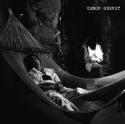 Conor Oberst
Conor Oberst
Conor Oberst
Merge Records, 2008
When I first heard Conor Oberst, I was an impressionable 14 year-old in grade nine. Following the recommendation of Bright Eyes by a friend whose musical interests I trusted (“Download ‘The City Has Sex With Itself,’ by Bright Eyes” he told me,) I engaged in musical exploration, learning of a great many styles, genres, and tepid over-classification, all of it new to me.
It wasn’t more than a year after my discovery that I ran into Conor Oberst’s first album he recorded and released: 1993’s cassette-only Water, an uncertain, less-confident release by the man that became, for all intents and purposes, Bright Eyes. He was a young 13 at the time of the release, and it was the first on Lumberjack, which later became the now-influential Saddle Creek Records.
So, here I am, listening to Mr. Oberst’s newest, a self-titled album, the man himself a decade-and-a-half older. I can still hear the high-pitched, trembling vocals of “You Should Be in Sweden” in his voice – he’s definitely still the same person – but a self-assuredness has replaced quavering vocals, and in place of strummed chords most beginners learn, there’s a skillful precision. Yes, this Conor Oberst is the same person he was 15 years ago, but he is, by no means, the same person. And for all my metaphorical imprecision, Mr. Bright Eyes himself hasn’t lost his.
This self-titled release is more in the vein of recent Bright Eyes, and considering he is the primary songwriter for the group, it isn’t surprising. The difference? Mike Mogis, his esteemed producer and bandmate, was too busy with other duties, so Oberst ventured to the creation of this solo album. So, while it may lack a little of the charm of Bright Eyes, there’s still an honesty to the album. More surprising, perhaps, is the album’s release on Merge Records, rather than Saddle Creek, the label Oberst co-founded. Despite whatever reason there may be for the label switch, Oberst told Filter Magazine in their Summer 2008 issue that there is “no bad blood” with his friends at Saddle Creek.
But none of that really affects the music: Conor Oberst maintains the perceived honesty the songwriter is known for, and, some of the prettier, flashier instrumentation aside – you know, the sort Mogis provided – this is a record that provides what is expected. The increasing maturity of Conor is apparent: He’s gone from the man responsible for the overtly emotional Fevers and Mirrors to somebody that, while not hiding his emotions, has stopped wearing them so blatantly on his sleeve.
Still, even without Mogis, some of the instrumentation is beautiful in its simplicity. Complete with that slight country bent Oberst picked up a few years ago, this self-titled album is typical fare for the musician, and that means it’s listenable – even addictively so – but it doesn’t mean it will hit the right chords with everybody. Oberst has had his share of detractors, and while their claims are not all valid, they certainly do make a point: You’re not going to get the best record ever from the man, nor will you get wild experimentation.
Still, Conor Oberst has grown from an immature kid to a competent singer-songwriter with no lack of vision. His latest self-titled release isn’t the best thing since sliced bread, but it’s a good set of well-thought tracks, and you can’t ask much more from a man who nearly turned the musical world upside-down with blatant honesty.
[amtap amazon:asin=B001APM3XQ]

